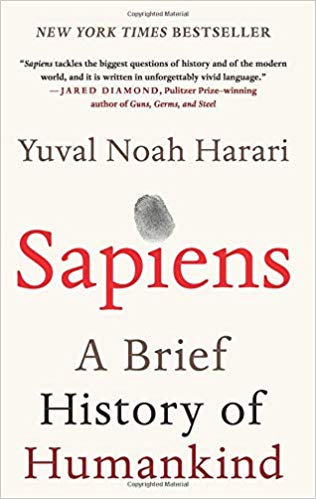And then, Man Created God!
A book review of Sapiens, A Brief History of Humankind by Yuval Noah Harari, 2014

Yuval Noah Harari is an Oxford graduate and professor in the Department of History at the Hebrew University of Jerusalem. He has written Sapiens, a book about our history, we are the sapiens as in homo sapiens. He traces time from when it began with the big bang, to our planet’s origin, the start of life, the prehistoric era when we shared space with six other near human species like the Neanderthals and on to today. To him, we are just another species on this planet and species come and species go. Although he sees Sapiens as the rulers of the world at the moment, he expects we will be gone in a century or so.
He writes about how living on this planet affects us and how we affect it. He looks at how evolution created who we are and how we function. In 2010 researchers found that up to 4% of DNA in a large percentage of us is still Neanderthal. It makes us wonder, what happened to them? Why did we dominate?
Harari notes how we evolved from animals of ‘no significance’ to thinking beings, farming beings, creative beings and now scientific beings. He credits part of our success to our inventions; buildings, laws, language, mathematics and money to name a few.
He describes what he calls the fraud of the agricultural revolution. That occurred when man changed from hunter gathering to farming some thousands of years ago. He contends that it made life worse not better for average people. Folks who had been happy spending a few hours a day foraging and hunting, as their diets changed to what they grew, had to work longer. In the process, ‘we did not domesticate wheat, it domesticated us.’ We worked harder but with more risk. Where once if there were crop failures we would move on, now we would starve. Also, with farming came private land ownership and eventually the capitalist system.
The reasons for this review are two; one is economics the other is fun.
Harari refers to the economy a lot. Two chapters are explicit; The Scent of Money and The Capitalist Creed. Trying to incorporate Western economic assumptions into the theory of how we have evolved is a stretch. His discussion about how man learned to trade and that with trade came travel internationally are wonderful. He refers to the market assumptions of Adam Smith that fit with life in Smith’s era. He neglects to mention that Smith was a professor of moral philosophy and assumed people would act decently. And he misses the growth of corporations, which have no understanding of ethics.
He writes about the invention and use of money which has had a profound impact on our development. He does that well and, in my experience, not everyone can. As I was finalizing the section in my book on money, I sent copies of the draft to two senior Chartered Accountants, people who reported on money for a living, for comment. One replied that he did not want to believe that’s how money is created! – out of thin air – as Harari explains. The other said that he believed he had read almost every book written about money and it was his belief that no one understood it. Harari understands and explains it well.
Trade, markets and money have been real factors in our evolution. They are real factors, they are part of but they are not economics. Harari seems to assume that economics is a science. In real science ideas build upon ideas to create a world view that allows us to make predictions. When the economic collapse of 2008 occurred, the largest collapse since the 1929 depression, it was unpredicted.
In 2008 economics was then over two centuries old yet still so inept that it missed the onset of the largest global economic meltdown of our lifetime. Perhaps that’s why Alfred Nobel never created a Nobel prize for economics. (The bank of Sweden created a prize in memory of Alfred Nobel which they give out annually to bank friendly economists to create the illusion that their work is science.) As John Kenneth Galbraith once said: ‘The only function of economic forecasting is to make astrology look respectable’.
The other reason for this review is devilment! Harari includes a lot about religion and although he doesn’t say so explicitly, he makes it clear that God is another of man’s inventions! We didn’t find god or discover god, we invented god or at times several of them. I wish he had used ‘Man Created God’ as a chapter title! The idea is throughout chapter 12 The Law of Religion, where he looks how we evolved from animism (when we thought everything had a spirit), polytheism (when we believed in multiple gods) and monotheism (one god, albeit in many configurations).
“History began when humans invented gods and will end when humans become gods” wrote Harari. This provides some insight into his next book: Homo Deus; A brief history of tomorrow, which has since been published.
Harari’s book is delightful to read, sweeping in scope, full of interesting ideas of history, challenging and includes a mixed bag of conclusions.
*
Note to readers: please click the share buttons above or below. Forward this article to your email lists. Crosspost on your blog site, internet forums. etc.
This article was originally published on the author’s blog: AnInsidersMemoir.com.

